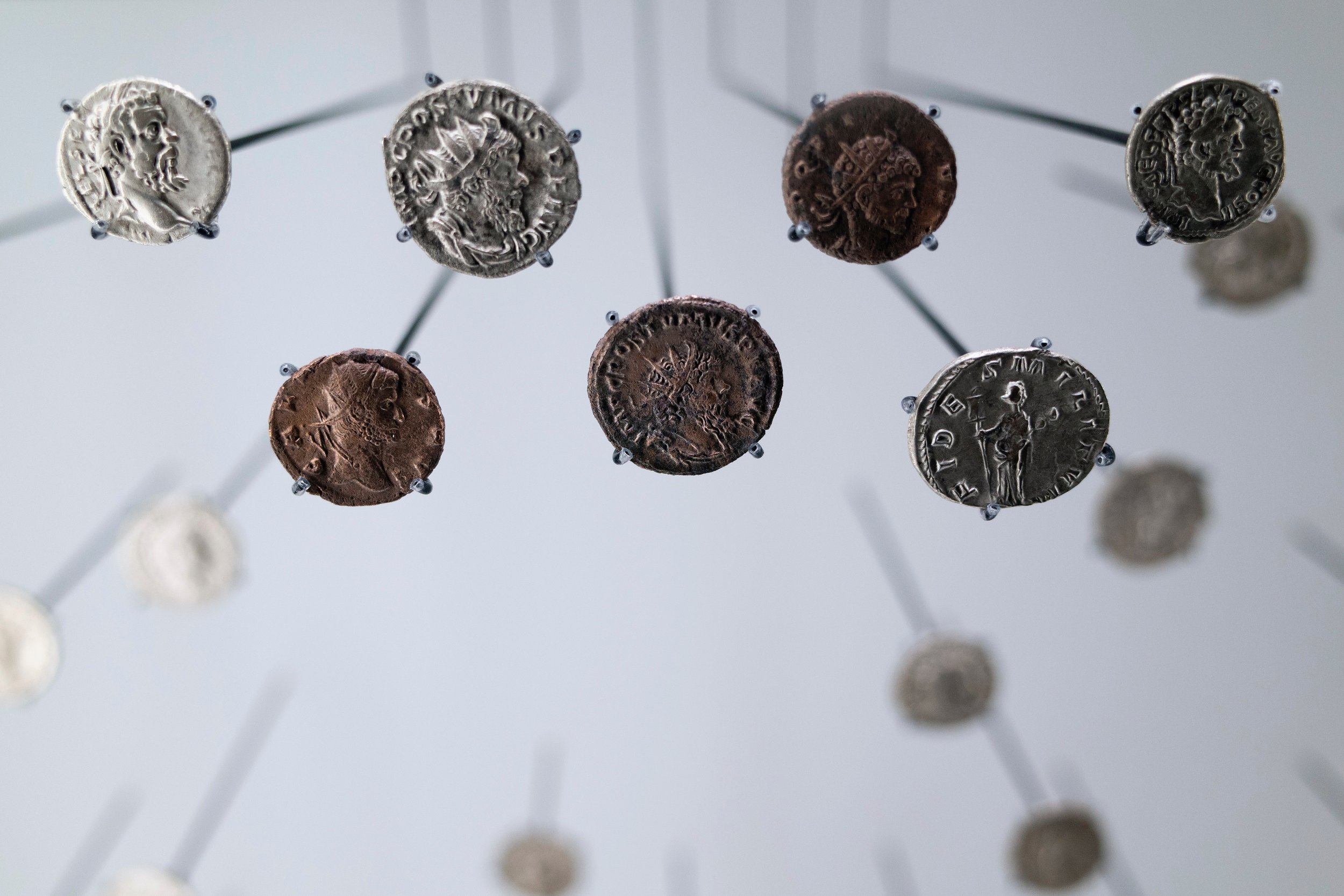
What Is Blockchain? What You Need To Know About Bitcoin, Ethereum, NFT’s, And Crypto
With Coinbase officially adding over 100,000 new accounts per day, I have started to get a lot more questions about Cryptocurrency and Bitcoin in general. My goal with this post is to provide people with a starting point to best get up to speed on the space, fast!
Old coins from the Roman Empire
It is a long journey down the rabbit hole of Cryptocurrency to truly understand everything that is going on within the blockchain space (and how it is affecting other industries). But it is not an impossible task, and you have to start somewhere. With Coinbase officially adding over 100,000 new accounts per day, I have started to get a lot more questions about Cryptocurrency and Bitcoin in general. My goal with this post is to provide people with a starting point to best get up to speed on the space, fast!
I first heard about Bitcoin in 2012 while writing daily Tech news for the Launch Ticker. I believe it was priced around $10, but I didn’t understand Bitcoin at the time, so I didn’t buy any. Then, in 2013, Bitcoin became what I would refer to as "Silicon Valley / Venture Capital" mainstream. Which in hindsight, I think we in the industry sometimes forget just how early to new ideas and industries we can be. Even still I did not buy any bitcoin. Even with everyone talking about something, it can be so easy to dismiss the things we don’t understand. And so, as Wayne Gretzky once famously said, "You miss 100% of the shots you don't take."
So two years later I took a deeper look at Bitcoin and I started to understand how it all works before buying some. I went down the rabbit hole; reading blog posts, sub-reddits, listening to podcasts, de-mystifying the blockchain, smart contracts, etc.
Which brings us to today. If 2016 and 2017 have taught us anything, it is that we are in a new era where awareness outpaces execution. In my opinion, social media and the connectivity of smartphones has no problem getting people talking about the hot topics of the day or week on the surface. But we are flooded with so much information that it has become harder to filter what is worth stopping, taking the time to learn more, and going deep on a subject.
And so today, my advice is to take some time to understand Cryptocurrency and it's surrounding technologies. Whether or not you are a believer in Bitcoin, Ethereum, or any other cryptocurrency, the technologies that have enabled this revolution, such as the blockchain, are almost certainly here to stay. I am going to lay out some information, which should help you gain a deeper understanding around the whole industry. I would recommend digesting them in the order I present them in, and remember to keep an open philosophical mind:
Understand Why We Have Money and How It Works Today:
Yuval Noah Harari, Author of the book Sapiens, explains how civilization came to have money over the course of evolution in this TED talk: "Why Humans Run The World". I recommend watching it all, but skip to 10:45 in the video if you want to fast forward to the money part.
This video on Money and Finance from John Green's youtube channel Crash Course is a super quick refresher on how our modern day monetary systems work. It even briefly mentions how Bitcoin has played a role as it has emerged over the past few years.
Bitcoin:
Banking on Bitcoin is a 2017 documentary currently on Netflix. The first 20 minutes will give you a great overview on how Bitcoin ad the technology around it works. With the rest of the film covering the history of cryptocurrency, regulation of the industry, who is Satoshi Nakamoto, the dark web, and how people have used Bitcoin to date. It features interviews with enthusiasts and experts, this documentary covers Bitcoin's roots, its future and the technology that makes it tick.
Blockchain:
The Blockchain is actually explained somewhat simply during this TED talk by Lorne Lantz.
In this episode of the Tim Ferris Show "The Quiet Master of Cryptocurrency", he is joined by Naval Ravikant (who you will also see in Ethereum TechCrunch talk below with Vitalik Buterin) and Nick Szabo (who you might remember from the Banking On Bitcoin documentary above).
This episode goes much deeper into the world of cryptocurrency. You will learn about how the blockchain works, the history of smart contracts, what a Merkle Tree is, the importance of decentralization, and so much more!
In this video from Wired, Blockchain researcher Bettina Warburg explains the blockchain in every age from a child up through graduate school. It then ends with a great conversation with another Blockchain expert.
Lastly with regard to the blockchain, if you click the button below you can see a step by step visual demo of the blockchain in action. I highly recommend clicking through the demo to better understand how blockchains work.
Ethereum:
At age 19, Vitalik Buterin, created Ethereum in 2013. To think about it simply, Ethereum is similiar to Bitcoin but it also allows developers to deploy code and software programs on it's blockchain.
Ethereum is a decentralized platform that runs smart contracts; applications that run exactly as programmed without any possibility of downtime, censorship, fraud or third party interference. These apps run on a custom built blockchain, an enormously powerful shared global infrastructure that can move value around and represent the ownership of property.
Buying Bitcoin and Cryptocurrencies:
The easiest way to get started with cryptocurrencies is by creating an account on Coinbase.
After signing up you will be provided with your own digital wallet, which is stored in the cloud, on Coinbase’s servers. This is important to note because you are trusting a third party to protect your wallet. There are other digital wallet alternatives if you would prefer to not store your cryptocurrency on Coinbase, such as storing your wallet on your computers hard drive or on an external Zip drive. Whichever you choose, be sure to pick a wallet that is secure. Using Coinbase you can buy Bitcoin, Ethereum and Litecoin.
Important Note: Be sure to ALWAYS use two factor authentication. Do not use SMS based two step verification as your phone number can be stolen depending on your phone company. To understand why this is important and learn some more security tips to secure your digital wallet, I recommend reading Cody Brown's article "How to lose $8k worth of bitcoin in 15 minutes with Verizon and Coinbase.com".
If you are looking to get involved with more Crypto Assets & Currencies I am linking to some getting started guides below:
A Beginners Guide To:
Bitcoin Cash
Ethereum
Ethereum Tokens
Monero
Litecoin
0x
Tezos
Decred
Zcash
For more cryptocurrencies you can check out Coin Market Cap to see what else is out there. Clicking on a currency on Coin Market Cap will show you more information about it, including historical prices, as well as tell you the available exchanges you can buy from.
ICO's:
Be wary of Initial Coin Offerings of new tokens. Many new coins that are being created are simply not needed in my opinion. Especially if the same function or utility could be done using an already existing cryptocurrency.
If you do find a crypto currency you like, then you need to evaluate the whole project, just like you would if you were investing in an early stage startup. Make sure you research the amount of money being raised, what the token does, the valuation that the project actually works and is live, the team behind it, etc. Just how with early stage startups, only the top 5% of companies are worth investing in, the same is true of ICO’s. Most ICO's will likely fail. Fred Wilson, has a good blog post on how to carefully evaluate these new crypto assets.
White Papers:
White papers lay out the foundation for how a crypto asset works and what principles it relies upon. In the world of crypto, they are similar to the pitch decks that startups put together today or a traditional business plan, and they are typically shared with the public. To really get a good understanding of what they look like, I am including the original Bitcoin white paper wrote by Satoshi Nakamoto and the Ethereum white paper.
Hard Forks:
Forks happen when a blockchain splits in two, going forward from a certain date. The main cause of a hard fork is because of a new rule that gets created by a certain portion of the community. This can create another currency if the new network is stable enough to sustain itself after the fork. Being as both the old and the new currencies share the same ledger history, customers with balances of the original currency at the time of the fork now have an equal quantity of the new currency. You can read more about forks here and the few most successful forks to date are:
Bitcoin Cash - Forked from Bitcoin on August 1st, 2017.
Bitcoin Gold - Forked from Bitcoin on October 25th, 2017.
Ethereum Classic - Forked from Ethereum in 2016.
Regulation And Sustainability:
Being as regulation can be quite complex, I am going to simply link out to some additional reading materials in this section.
State Regulations:
China
Singapore
South Korea
Historical Incidents:
Mt. Gox: In 2014, 850,000 bitcoins, worth $450 million at the time, had disappeared or been stolen by hackers.
DOA: In June 2016 an anonymous hacker exploited a critical flaw and stole $31 million in Ether in a few minutes.
Energy Consumption:
High Energy Consumption:
Low Energy Consumption:
Wall Street
J.P. Morgan
Futures Contracts
The Future of Cryptocurrency:
I encourage you to clickthrough and view all of the slides Chris Burniske, Author of Cryptoassets: The Innovative Investor's Guide to Bitcoin and Beyond, has put together. I have shared the first slide and my favorite slide below:
DISCLAIMER: These are just my personal thoughts and resources. I hope it helps you learn about the cryptocurrency industry so you can better make your own decisions. Be sure to do your own thorough diligence before making any financial decisions. Always invest responsibly.
Andrew Weinrich Is Predicting Our Future
On this episode Andrew Weinrich sits down with us at his offices in Brooklyn New York. Andrew is the founder of Andrews Roadmaps and the host of the new "Predicting Our Future" podcast.
Andrew Weinrich
On this episode Andrew Weinrich sits down with us at his offices in Brooklyn New York. Andrew is the founder of Andrews Roadmaps and the host of the new "Predicting Our Future" podcast.
As a serial entrepreneur, Andrew created the first ever social network called, Six Degrees. At its height, SixDegrees had around 3,500,000 fully registered members before being bought by YouthStream Media Networks in 1999 for $125 million. In more recent years, Andrew has sold 2 more businesses including Xtify and Meet-Moi. He is currently the co-founder and Chairman of Indicative, a data analytics startup. He also hosts Predicting Our Future, a podcast about the next revolutions in technology. Andrew shares many incredible lessons from his experience over the last 20 years, such as:
- How the first social network, Six Degrees, was created
- What it was like to exit a company for over $100 million
- How Social Networking has changed over the last 20 years
- The future of Social Media
- What ties all of Andrew's companies together
- How to ride the "wave" of new technologies as they emerge
- How he is Predicting Our Future
Ambition Today Question of the Day™:
"What advice do you have for people who are obsessing over getting rich and making a large amount of money to solve all of their problems?
Quote Of The Episode:
"You want to be a critical thinker. Investors assume first and foremost, that whatever plan you have is wrong. That whatever you launch won't be right, it will require pivoting. The question is are you someone who is capable of pivoting? If you're a critical thinker, you will be capable of pivoting."
"Entrepreneurs take advantage of moments in history. They are not determinative of those moments."
Links from this episode:
- Andrew Weinrich on Twitter
- Andrew Weinrich Linkedin
- Andrew's Roadmaps
- Predicting Our Future podcast
- SixDegrees.com
- Founder Institute New York
- Toptal
- Audible
Thank you so much for listening and applying these useful tips and strategies to your life! If you have a chance, please drop by and leave a review for the show on iTunes by clicking here. Also, who should I interview next? Please let me know on Twitter or in the comments. Do you enjoy this podcast? If so, please leave a short review in the comments below. It keeps me going…
Be sure to listen and subscribe to Ambition Today on iTunes Store Apple Podcasts for iOS, on Google Play Music or Stitcher for Android.
Listen to this episode now:
The iPhone Is Ten Years Old
The iPhone is officially ten years old this week. I know, I can't believe it has been ten years either...
Steve Jobs, 2007
The general consensus in the technology industry is that the expontential growth of mobile has finally peaked, after years of driving massive technology growth and value for venture capitalists. While it is undeniable that the hyper growth mobile experienced during the past decade (which venture capitalist rely on) has slowed, I have fought the notion that mobile has truly peaked. Today for the first time though, it hit home for me that maybe mobile phones have reached most of their potential by something I didn't see coming; time.
The iPhone is officially ten years old this week. I know, I can't believe it has been ten years either. I still remember when new iPhones were the hottest thing you could get your hands on. You could touch it with your fingers to use it. It had pinch to zoom and slide to unlock! Included a 2 Megapixel camera, headphone jack, single home button, accelerometer and a proximity sensor. It talked to the internet and all of it was in your pocket!
The past year has shown that investors are looking for new industries and technology sectors to invest in. Fred Wilson has predicted artificial intelligence will be the new mobile. As proof of this, Amazon's new home speaker that you talk too, the Echo, was one of the most popular products of the year. Other technologies with the label artificial intelligence seem to be creeping into many of our existing products. For example, my to do list app, Todoist, now uses A.I. to learn from me overtime and automatically reschedule my tasks that become past due.
This implication means many things to Apple and it's need for new product lines. The Apple Watch was a mild success/failure depending on how you view it. Airpods seem to be a new favorite and I personally love mine, but deep diving into Apple's future is much more then we need to get into here. Instead I would like to recognize it's past. In honor of the ten year anniversary of the iPhone I found Steve Jobs keynote from 2007 and shared it below. I encourage you to watch the first few minutes to remind yourself just how revolutionary the new iPhone was at the time and how funny Steve Jobs was while announcing it.
Then just let it simmer that the iPhone is now ten years old- and what that means for the technology industry. Putting that number ten on the age of the iPhone makes it feel a lot more like my laptop in terms of excitement. As new innovations come from wearables it is only logical that mobile is going the way of desktop computers & laptops. My phone is now something I use multiple times a day, everyday, but just is not as exciting in the long run.
Mobile will continue to grow as it expands into new markets and territories across the planet. But as with the greatest of technologies we rely on as a species, without large innovations it will fade into the background of our lives, perhaps even for he better. If mobile fades into something we use everyday without thinking, then maybe it can truly enhance our human experience instead of drawing us away from things we should be focusing on. It will go the way of electricity, where we just turn it on without thinking. To become such a utility in our daily lives that it just fades into the background, to be taken for granted the miracle it truly is.
What Does Patriotism Mean
Over the July 4th weekend we celebrated the 240th anniversary of America's independence and I visited the inaugural location where George Washington was sworn in as the first President.
George Washington's Inauguration Site, Federal Hall, NYC
I think it is important to take time to reflect when life gives us the opportunity to do so. Over the July 4th weekend we celebrated the 240th anniversary of America's independence and I visited the inaugural location where George Washington was sworn in as the first President. If you want to visit too, it is located at the Federal Hall on Wall Street here in NYC. Just across from the New York Stock Exchange.
I was thinking about what does it mean to be an average American. What did it mean then and what does it mean 240 years later, today. There has been a lot of heated controversy in the media about this recently, due to the upcoming election.
Then my brother text me a youtube video of that I NEEDED to watch in honor of the weekend. The video is of John Cena explaining what Patriotism means in today's world. I watched it on my brothers recommendation and to my amazement thought the words leaving the WWE Champion's mouth were so perfect I would share it with you here. I promise to get back to startups in my next post, but for now watch what John Cena had to say below. You will be pleasantly surprised I think.
Patriotism - devoted love, support, and defense of one's country.
The Secret History Of Silicon Valley By Steve Blank
Silicon Valley's name is synonymous with high tech, innovation and startups. But even the great Silicon Valley had to start somewhere and it did so in government secrecy and wartime urgency.
Silicon Valley's name is synonymous with high tech, innovation and startups. But even the great Silicon Valley had to start somewhere and it did so in government secrecy and wartime urgency. Steve Blank tells how Valley sprang out of the technology fight over the skies of Germany and secret efforts around (and over) the Soviet Union. This lecture is a must for those that want to understand how Valley came into being. (Thanks to Jeff Wald for surfacing this video and sharing with me.)












